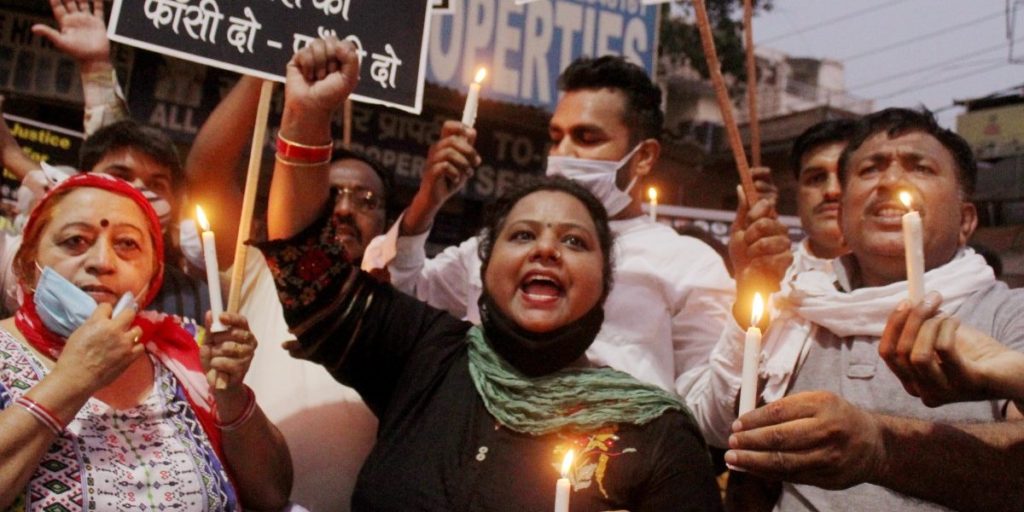In her poem ‘Tulips’, Sylvia Plath describes the emotional contours of a person recovering from an unknown operation in a sterile hospital room. Her husband, Ted Hughes, claimed she had written it while recovering from an appendectomy; other scholars have found the shadow of a previous miscarriage and hospitalisation in the poem. The invalid in the poem has received a bouquet of red tulips she doesn’t want – it prevents her from sinking into an anaesthetised oblivion, which is the only relief from physical and emotion pain for her. “I have no face, I have wanted to efface myself,” she writes. I was 16 years old when I first read this poem and immediately realised I could experience the trauma of miscarriage only through Plath’s poem.
Reading Still We Sing (2020), a volume of poetry by poets from South Asia and edited by Austria-based poet and editor Sarita Jenamani, allows me a similar visa into a world of violence and defiance that I am aware of only in the second person. “The founding stone of today’s South Asia is stained with blood of its women. Physical, as well as psychological, torture of its women was quite visible in the wake of the Partition of India and this gruesome legacy continues to date in one form or another,” she writes in the editor’s note, ‘Of Silence, Speaking Up and Solidarity’. According to some sources, some 75,000-100,000 women were raped, killed and kidnapped during the region’s cartographic cosmetic surgery in 1947.
The bodies of women have continued to be targets of violence during war and peacetime in the subcontinent. For example, during the 1971 war that resulted in the creation of Bangladesh – its 50th anniversary is being celebrated this year – 200,000-400,000 women in what was then East Pakistan were raped, killed or kidnapped by different warring factions. “In 1971, multiple wars broke out in East Pakistan,” writes historian Yasmin Saikia in her 2011 book, Women, War and the Making of Bangladesh. The first three conflicts were a civil war in Pakistan, an international war between India and Pakistan and a war between Bengali- and Urdu-speaking inhabitants of the region. And fourth, “a rampant gender war broke out against vulnerable women within East Pakistan,” Saikia adds.
Bangladeshi-origin American poet Tarfia Faizullah had performed an elaborate task of poetic journalism by collecting oral histories of the survivors of rape during the 1971 war in her first book, Seam (2014). Her poem ‘Snake Princess’, included in this collection, draws upon an elaborate mythology of snake goddesses in Bengal. It begins with the description of intercourse; it’s not clear if it is consensual:
The guard wasn’t found dead outside the gates, he was dead because he was found inside of me
It moves through a rural, fantastical landscape and coils towards its tail in a repudiation – quite literally – of patriarchy.
Did I want to hurt my father? Once I coiled around him until he couldn’t draw a break – to speak
Feminist writers such as Gloria Steinem, Janice Moulton and Adele Mercier have made us aware of the “maleness” of language. The silencing of the patriarch is, in some ways, a subversion of “male” language itself.
But war is not the only theatre in which women are targets of the most unspeakable violence. In her poem ‘Where the Heart Goes to Die’, the Indian poet Mrinalini Harchandrai recalls, quite obviously, the Nirbhaya case of 2013. (There are three other poems entitled ‘Nirbhaya’, by Mukul Mishra, Shanta Acharya and Sujata Mishra, in the book.) The poem is however not an outraged outburst but a reflective meditation on the futility of any effort, legal or social, at redress after such an event:
Candlelight vigils didn’t revive her from the searing eclipse cornering all her future selves
Newspaper columns, petitions on social media, debates on TV – all are pointless in the face of the brutality her body was subjected to. Not even the amendment to laws and the conviction of the alleged rapists were of any use to the victim.
changing the laws didn’t convert the ribbons scored in her intestines back, life sentences in the courtroom didn’t compare with hers when we found steel rusting in her cold body cold.
And nothing seems to have changed even seven years since. Last year, another woman was brutalised in Hathras, Uttar Pradesh, making such events regular rather than the exceptions. While India reported a significant rise in crime against women in 2019, so did Pakistan, Bangladesh and Sri Lanka.
As we prepare to celebrate another International Women’s Day on March 8, this is a sobering thought. “This anthology will serve as a catalyst for our women to build-up more courage and solidarity and to help assemble their scattered voices and to speak up,” Jenamani wrote in her editor’s note. Her editorial endeavour of collecting about 120 poems, both contemporary and older, in original and translation is at least a beginning in that direction.
One is reminded here of Tishani Doshi’s poem, ‘Girls are Coming Out of the Woods’, also included in this anthology.
Girls are coming out of the woods,
wrapped in cloaks and hoods, carrying iron bars and candles and a multitude of scars, collected on acres of premature grass and city buses, in temples and bars.
(Uttara Das Gupta’s novel Ritual was published last year. Article courtesy: The Wire.)

